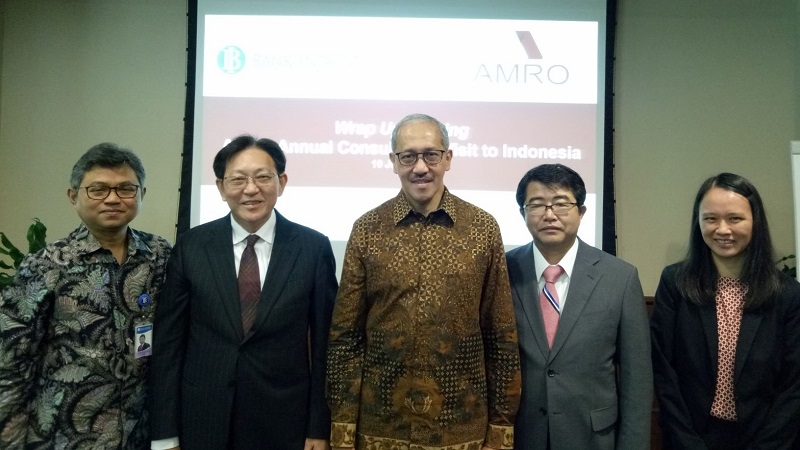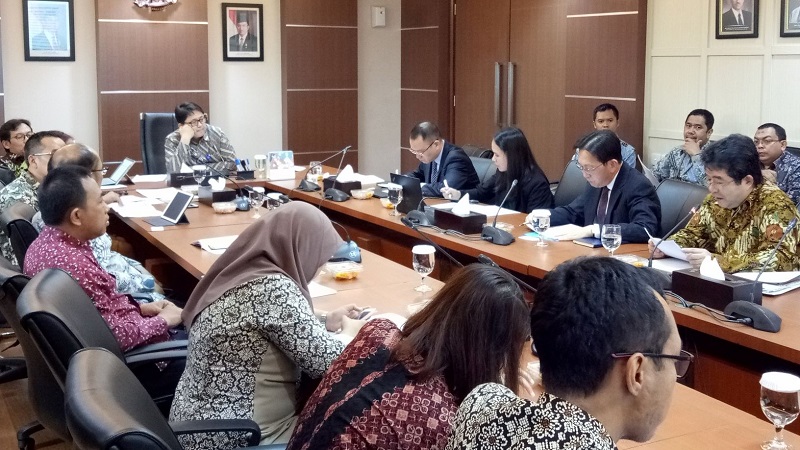
AMRO Chief Economist Dr. Khor Hoe Ee (second from left), Lead Economist/Mission Chief Dr. Sumio Ishikawa (fourth from left), Bank Indonesia Deputy Governor Mr Dody Budi Waluyo (middle) and Executive Director Mr. Doddy Zulverdi (first from left) pose for a group photo after the policy discussion.
SINGAPORE, July 17, 2019 – Indonesia’s economy is expected to remain resilient amidst ongoing external headwinds, according to the preliminary assessment by the ASEAN+3 Macroeconomic Research Office (AMRO) after its Annual Consultation Visit to the country from July 1 to 10, 2019.
The mission was led by AMRO Lead Economist Dr. Sumio Ishikawa, and participated by AMRO Director Mr. Toshinori Doi, and AMRO Chief Economist Dr. Hoe Ee Khor. The discussions focused on Indonesia’s recent developments and outlook, risks and vulnerabilities, global and regional spillovers, and policy responses.
“Indonesia’s growth prospects are solid, supported by a large infrastructure investment program and a continuation of structural reforms. Real GDP is projected to grow at 5.1 percent in 2019 and 2020, while inflation is firmly anchored within the target band of 3.5±1 percent and 3.0±1 percent in 2019 and 2020, respectively”, said Dr. Ishikawa. “In the face of the external uncertainties and headwinds, continued prudence in macroeconomic policy mix and structural reforms have been successful and will remain essential in strengthening external resilience and stimulating economic growth.”

AMRO mission team exchanges views with officials of the Ministry of Finance of Indonesia during a policy discussion.
Despite external headwinds, the economy is expected to grow robustly, supported by resilient consumption and sustained investment. Export performance, meanwhile, continues to be constrained by a weaker global outlook and subdued commodity prices. The outcome of the General Elections in April 2019 is expected to enhance structural reform momentum and promote Indonesia’s economic growth in the future.
An easing in global financial conditions has alleviated downward pressure on the external position. Indonesian financial markets experienced high volatility in 2018, reflecting foreign investors’ pullback from emerging markets, driven by a stronger U.S. dollar, coupled with Fed rate hikes and escalating global trade tensions. Foreign investors have since returned to net-purchase of rupiah-denominated bonds and equities, following a decline in U.S. Treasury yields and a dovish pivot by the Fed and other major central banks. Indonesia’s recent sovereign upgrade by S&P Ratings has also boosted investors’ confidence. These developments, combined with the authorities’ policy responses, have strengthened the rupiah from a year earlier, and increased the gross foreign reserves from USD114.8 billion in September 2018 to USD123.8 billion at end-June 2019.
The banking sector remains sound with strong capital buffer and stable asset quality. Despite some tightening, especially in a number of smaller banks, liquidity has been adequate in the overall system. Credit growth has picked up from the middle of 2018 and is expected to remain elevated at around 11 percent (yoy) to support domestic economic activity.
The authorities have actively recalibrated the policy mix to strengthen resilience and support growth. On the monetary policy, Bank Indonesia (BI)’s “pre-emptive, front-loading, and ahead-of-the-curve” policy rate hikes had supported Indonesia in weathering emerging market turbulences in 2018. While the downward pressure on the rupiah has eased, financial markets remain volatile and BI has been prudent in leaving the policy rate on hold. To ensure adequate liquidity in the banking industry to finance economic activity, BI lowered the rupiah reserve requirement for conventional and Islamic banks by 50 basis points to 6.0 percent and 4.5 percent, respectively, with the average reserve requirement remaining at 3.0 percent. Going forward, BI is committed to maintaining an accommodative macroprudential policy stance to catalyse bank lending and expand economic financing while ensuring financial stability.
On the fiscal front, policy measures to broaden the tax base and enhance tax compliance, and to improve spending quality have been stepped up. Budget realisation in the first five months, meanwhile, pointed to a moderate revenue growth, underpinned by a dip in economic activity and subdued commodity prices. Going forward, lower energy subsidies and a reduction in revenue sharing to the local government are expected to keep the fiscal deficit at 1.9 percent of GDP in 2019.
Infrastructure investment and structural reforms are expected to boost Indonesia’s growth potential. The infrastructure development program has progressed steadily under a strong public stewardship and joint funding with the private sector. The latest economic package has extended tax incentives to a wider range of investment activities with higher value-added and sought to open more sectors to foreign investors. The authorities’ recent emphasis on human capital investment in the areas of education, vocational training, health, and social safety nets are also a welcome move. Indonesia is poised to realize its tourism potential, benefiting from initiatives such as the “10 New Bali’s”, alongside enhanced connectivity. Efforts have also been stepped up to deepen the financial markets to support economic financing on a larger scale and ensure stability in the money and FX markets. These efforts include the introduction of new financial instruments and policy measures to broaden the domestic investor base.
The mission team would like to thank the Indonesian authorities for their warm hospitality and support. The consultation visit has provided AMRO with valuable insights and deeper understanding of the Indonesian macroeconomic and financial conditions, its policy framework, and ongoing structural reforms.
—
About AMRO:
The ASEAN+3 Macroeconomic Research Office (AMRO) was established to contribute to securing the economic and financial stability of the ASEAN+3 region, which includes 10 members of the Association of Southeast Asian Nations (ASEAN)and China; Hong Kong, China; Japan; and Korea. AMRO fulfils its mandate by conducting macroeconomic surveillance, supporting the implementation of the regional financial arrangements, the Chiang Mai Initiative Multilateralisation (CMIM), and providing technical assistance to the members.
